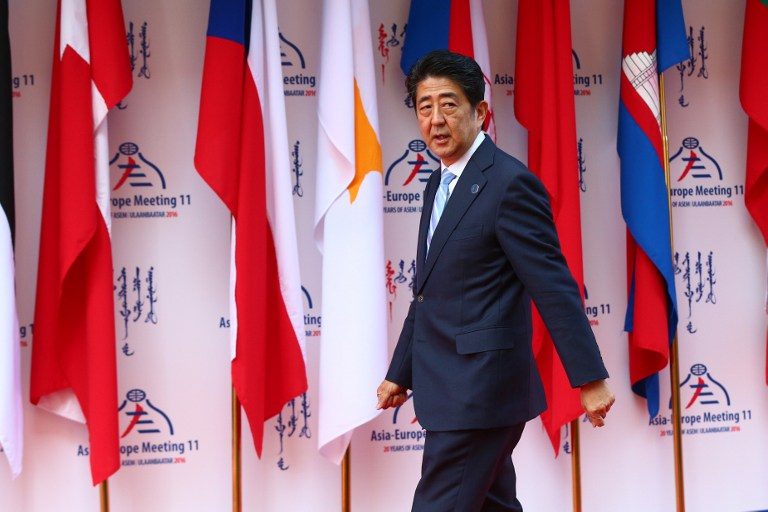SUMMARY
This is AI generated summarization, which may have errors. For context, always refer to the full article.

ULAN BATOR, Mongolia – Tokyo raised pressure on Beijing at an Asia-Europe summit Saturday, July 16, to respect an international tribunal’s ruling that dismissed its claims to much of the South China Sea.
At a retreat outside the Mongolian capital Ulan Bator, Prime Minister Shinzo Abe told the assembled leaders that the rule of law was “a universal principle that the international community must firmly maintain,” according to Japan’s Jiji Press.
“I strongly hope the parties to the dispute comply with the award and lead to a peaceful solution of the dispute in South China Sea,” he said.
The Permanent Court of Arbitration in The Hague on Tuesday, July 12, ruled that there was no legal basis for Beijing’s claims to much of the South China Sea, which are embodied in a “9-dash line” that dates from 1940s maps and stretches close to other countries’ coasts.
The ruling has proved a boon to Tokyo, which is embroiled in a separate territorial dispute of its own with Beijing and vies with it for influence across Asia.
China boycotted the PCA hearings, saying the court had no jurisdiction, and has reacted furiously, vowing to ignore the ruling and arguing that it misinterprets international law.
It also said the subject should not be brought up at the Asia-Europe Meeting (ASEM) in the Mongolian capital.
But despite Chinese objections, the EU also weighed in on the subject, with President Donald Tusk telling reporters that the grouping “will continue to speak out in support of upholding international law”, adding that it had “full confidence” in the PCA and its decisions.
“It’s not so easy to agree with our Chinese partners when it comes to this issue” he said. “Our talks were difficult, tough, but also promising.”
‘Hyping up’
The comments by Abe and Tusk on Saturday followed a blitz of meetings between the Japanese leader and officials from around the region, including his Vietnamese counterpart Nguyen Xuan Phuc and Philippine Foreign Secretary Perfecto Yasay, on the summit sidelines as he sought to build consensus on the issue.
Both countries have competing claims with Beijing in the strategically vital South China Sea, where tensions have mounted over the Asian giant’s construction of artificial islands capable of supporting military operations and its claims on the region’s marine resources.
Manila, which brought the PCA case, has promised not to “taunt or flaunt” the verdict.
But Japanese foreign ministry spokesman Yasuhisa Kawamura told Agence France-Presse that in his meeting with Abe, Yasay agreed to “closely cooperate” at upcoming ASEAN-related conferences to ensure that the “parties to the dispute comply with the final award of the tribunal”.
Leaders of the Southeast Asian grouping have so far failed to issue a statement on the ruling, reportedly due to objections from member states with close ties to China.
In Abe’s meeting with Phuc, the two leaders agreed that the tribunal’s ruling should be observed, and Abe offered to increase cooperation on building Vietnam’s maritime law enforcement capabilities, Kawamura said.
Abe also brought his argument directly to Chinese Premier Li Keqiang during a heated 30-minute meeting Friday, July 15.
Kawamura described the exchange as “frank and candid” and Chinese state media accounts described the Chinese leader telling Abe that Japan should “stop hyping up and interfering” in the dispute.
Beijing had hoped to use the ASEM summit – official theme “Partnership for the Future through Connectivity” – as an opportunity to showcase its global initiatives, such as the One Belt, One Road program, an ambitious plan to build infrastructure projects across the Eurasian region.
China has sought to assert its claims in the South China Sea by building a network of artificial islands capable of supporting military operations, and this week reiterated its right to declare an Air Defense Identification Zone in the area, which would demand civilian flights submit to the authority of its military.
While the summit’s final communique made no specific mention of the South China Sea, it said that leaders “reaffirmed their commitment” to maritime security and settling disputes according to the UN Convention on the Law of Sea. – Rappler.com
Add a comment
How does this make you feel?
There are no comments yet. Add your comment to start the conversation.